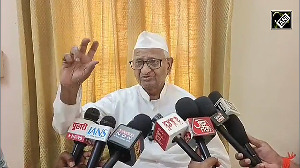Pakistan-based terror group Lashkar-e-Tayiba's recent attempt to recruit an American national to carry out terrorist attacks against targets in India, including individuals and institutions, is yet another tangible manifestation of its global reach, now extending even into America, intelligence sources have said.
These sources told rediff.com that while the linkage between LeT and Al Qaeda was well known for some years now, the Lashkar had now metamorphosed into an integral operational arm of the Al Qaeda with the Pakistan intelligence service ISI-trained Ilyas Kashmiri being the latter's key operatives.
Last month, the Chicago Federal Bureau of Investigation's Joint Terrorism Task Force arrested a man identified as David Coleman Headley, 49, a US citizen who changed his name from Daood Gilani in 2008, at O'Hare International Airport before boarding a flight to Philadelphia intending to travel to Pakistan.
He was charged with one count of conspiracy to commit terrorist acts involving murder and maiming outside the United States and one count of conspiracy to provide material support to that overseas terrorism conspiracy.
Also arrested was Tahawwur Hussain Rana, 48, a Pakistani national and citizen of Canada who like Headley, resides in Chicago.
Rana, the owner of several businesses, was apprehended at his home by federal agents and charged with one count of conspiracy to provide material support to a foreign terrorism conspiracy that involved Headley and at least three other specific individuals in Pakistan.
As part of the conspiracy to provide material support to terrorism, Rana, according to the FBI, allegedly helped arrange Headley's travels overseas and conceal their true nature and purpose to survey potential terror targets overseas, and discussed potential targets for attack with Headley.
The FBI affidavit said that Headley allegedly reported and attempted to report on his overseas surveillance to other conspirators, including Ilyas Kashmiri, which the US agency identified as the operational chief of the Azad Kashmir (Pakistan-occupied Kashmir) section of Pakistan-based terror outfit Harakat-ul Jihad Islami.
The sources said that LeT, conceived, armed and trained by the ISI to launch attacks in Kashmir against Indian military forces and civilians, had now become a "jihadi Frankenstein" beyond the control of ISI, and had now graduated to much broader attacks, including within India, and were now operating under the guidance of Al Qaeda.
Although there were some rogue elements from ISI and the Pakistani military involved with it, the latter no longer held the reins of the LeT and couldn't rein it in or unleash it as in the past.
The FBI's affidavit had disclosed that Headley was part of a conspiracy to bomb India's National Defence College in New Delhi, as well as two prominent boarding schools --Doon School in Dehra Dun and Woodstock in Mussoorie.
It also said that Headley, Rana and Aman Rashid (Pakistan's consul general in Chicago), who would interact regularly with Rana, all hailed from the same school in Pakistan.
Earlier, Bruce Riedel, an erstwhile CIA official, had told rediff.com, "Since 9/11, several key Al Qaeda operatives arrested in Pakistan have been found in safe houses run by the LeT."
In fact the first major Al Qaeda lieutenant caught after 9/11, was apprehended in an LeT safe house in Faisalabad, he added.
Intelligence sources also continued to point to how Gary Schroen, who served as CIA station chief in Pakistan and led the first CIA team into Afghanistan after 9/11, had consistently pointed to the Al Qaeda-LeT connection, and spoken of how in the aftermath of 9/11, whenever a raid was conducted in Pakistan against Al Qaeda, the outfit's members were found being hosted by militant Pakistanis, primarily from the LeT.
They spoke of the LeT, however, at that time under the control of the ISI, even though the had Al Qaeda connections but that over a period of time the ISI reins on the LeT dissipated and it was as an Al Qaeda operational arm that it began to outreach globally and begin active recruitment outside of Pakistan.
In an affidavit filed on November 3, the FBI in a motion for detention pending trial of Rana, said Rana and Headley 'actively discussed the efforts to communicate with Kashmiri'.
The FBI noted how Rana and Headley had discussed the need to get Headley's 'reports' and 'notes' to Kahsmiri.
Riedel, in talking about Kashmiri said his life story 'helps us address one of the big questions in the current debate -- the nature of the economy'.
"He is a Kashmiri, obviously born in Pakistan Kashmir. He joined the struggle against India in Kashmir in 1994, where he began by taking American, British and Israeli hostages, some of which were killed."
Riedel said Kashmiri "went on to have a spectacular career in supporting the struggle against the Indian Army in Kashmir".
Pakistani Army's Special Security Forces -- the equivalent of the American Green Berets -- trained him. He was captured by the Indians but escaped.
"Then he was toasted by the Pakistani Army and the Pakistani intelligence services as a hero," but in 2005, Riedel said, "he joined the Al Qaeda. He became a convert to the global Islamic Jihad, and Al Qaeda sent him to Afghanistan, where he was critical in teaching the Taliban the tactics of small-unit warfare, ambushes and patrols, which they have been successful in using in the last several years."
Kashmiri, who was now focused on conspiring attacks on India, was also simultaneously active in Pakistan.
Riedel said that it was Kashmiri who was "responsible for the murder of a former commander in the Special Security Group in 2008, and he has plotted attacks on Chief of Army Staff (General Ashfaq) Kayani. He's number two on the Pakistan's most wanted list today and he is almost certainly involved in the attacks that are going on in Pakistan today."
But he said, "My point here is that he is a classic demonstration of how the terrorists refuse to stay in lane. We want to keep them in little boxes, but they don't want to stay in their boxes. They interact with each other. It's the syndicate of terrorism that we are facing in Afghanistan and Pakistan that is so difficult to deal with."







 © 2025
© 2025